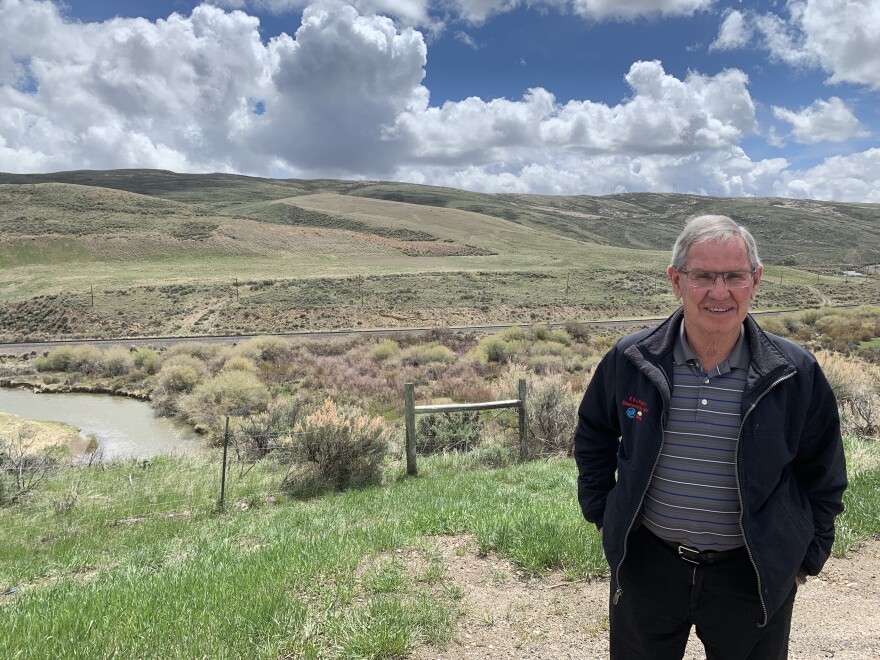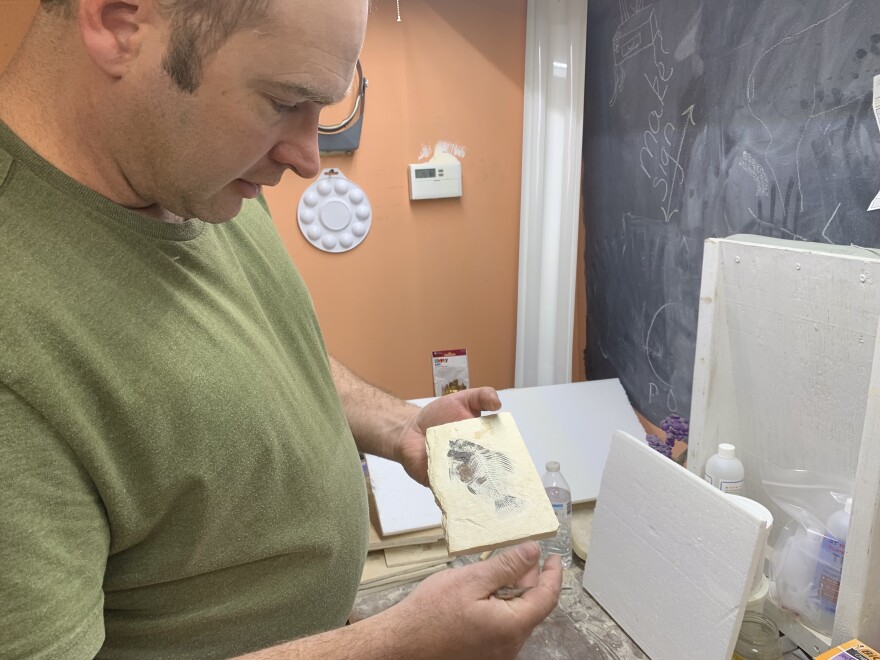Jim Bills stands under a carport at his white ranch-style home in Kemmerer, Wyoming. He's lived in Kemmerer for the past 40 years. He's worked at the Kemmerer coal mine as a truck driver, laborer and driller for 35 years, until he retired. The mine, along with the power plant it feeds, are central pieces of the local economy.
"You know, a year ago the town was going smooth. Same thing it's been doing for 100 years. [It's a] nice place to live, everybody's happy. We didn't see it coming," Bills said.

What the town didn't see coming was that a large utility company put its Kemmerer-based power plant on a list of possible closures in next three years. That's on top of the local coal mine's owner, Westmoreland, filing for bankruptcy last year. That it caused retirees, like Bills, to lose out on medical benefits. The news shook Kemmerer, said Mayor Tony Tomassi.
"I thought 'well, I'm seeing what it says, but this can't be real.'"
Now, the southwestern Wyoming town is being challenged to imagine life without coal at its center. City leaders like Tomassi are racing to avoid becoming just another ghost town.
He drove around Kemmerer and neighboring Diamondville, and said the area was built by coal. We passed a cement wall with an engraved image of figures taking a pickaxe to coal, abandoned antique shops, and a park called Miner's Memorial. Tomassi pointed out a recreation center that was built by energy companies.
"Industry got together, built it, paid for it through a bond they taxed themselves on," he said.

In December, Pacificorp announced it would be cheaper to switch to renewables or gas than to keep running over half of its coal plants. No final decisions have been made about plant closures. Kemmerer's Naughton Power Plant was already scheduled to close in 2029. But several scenarios in this new plan have it closing seven years earlier-in 2022. Tomassi said the closure would mean the loss of 126 jobs and others connected to it.
"It's all the auxiliary industry that goes around with that," he said, like trucking companies, cement suppliers, and electricians.
The largest is the Kemmerer coal mine that employs more than 250 people. It relies on the Naughton plant as its primary customer. If both the mine and plant went under, it would mean the loss of hundreds of jobs and the two largest taxpayers in the county.
"Because if you take those jobs out of the town, at this point, I don't know how you replace them," Tomassi said.
He said all the uncertainty is hurting business. His car dealership isn't selling as much. You can see "for sale" signs on homes all over town. A local realtor said property values are declining.
So in December, Tomassi and other city leaders came together to discuss plans for a revitalized Kemmerer, plans that don't lean quite so heavily on coal. They hired a new city administrator, Brian Muir, to focus on that and he's been busy with conferences, consultant meetings, and summits, so busy he could only meet at 9:30 pm in the dimly lit city council chambers.
"Careful strategic planning is really even more important for our community than it ever has been because we've been, we've been in the coal for decades," Muir said.

He helped put together an action plan with an aggressive timeline. It's three main points: diversify the economy, increase manufacturing, and boost quality housing. He's looking at tourism opportunities, like attracting visitors interested in fossils. Fifty million years ago, this area was full of tropical lakes. Robert Bowen owns a fossil shop in town.
In the dusty backroom of his shop, Wyoming Fossils, Bowen sifted through squares of stone with imprints of small fish, leaves, and even insects.
"There's no two the same," he said.
Bowen said quarries nearby have accessible fossils, and the town could take advantage of that: market it more, gear vacation homes to it.
"It's not a cure, but it will help. Every little bit we can do is going to help us," he said.

Outside of town, Councilman Mark Quinn is excited about another opportunity. At the load-out station where the Kemmerer mine prepares to send its coal elsewhere, Quinn pointed into the open prairie imagining an industrial park on the 400-acre site out there.
"I would hope to see manufacturing facilities with part staged. We don't see manufacturing facilities with those parts staged out here to lay down yards with the pipeline parts or various things, possibly silos, that handle the materials," Quinn said.
He said wind-turbines could be made or even repaired here. Or possibly manufacture a usable coal material or turn it into a gas. Quinn said one of the town's biggest resources is are the skilled workforce. That could be used here.
Back in Kemmerer at Jim Bills home, he said he loves living here. He's always known it as an energy town, though, and struggles to imagine something else, especially if the plant closes soon.
"Hopefully, there are solutions but not three-year solutions. Nothing's going to happen in three years and this town will just dry up blow away."
Pacificorp will makes its closure decision for the Naughton Plant on August 1.









